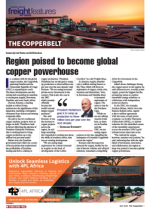America is diligently fostering stronger ties with Africa, aiming to secure access to vital battery minerals on the continent. China has already established significant copper and cobalt projects in the Democratic Republic of Congo and Zambia.Earlier this year, during a visit to South Africa, US Deputy Treasury Secretary Wally Adeyemo said President Joe Biden was continuing to urge the US Congress to renew Agoa, showing support not merely for a trade agreement but for the country’s close partnership with companies and people in Africa.Adeyemo is on record saying that while the US government has launched a raft of measures to incentivise increased production of strategic and critical minerals at home, notably under the Inf lation Reduction Act, African resources are vital considering the continent’s vast resources.Part of this includes work by the US International Development Finance Corporation (DFC) that is supporting critical infrastructure development across Africa. The DFC has approved a $250-million loan to Africa Finance Corporation (AFC) that will strengthen the capital position of a key pan-African multilateral development finance institution to support its investment activities, including infrastructure projects critical to economic growth and development.The AFC, in turn, has signed an expression of interest with Kobaloni Energy to provide $100m in financing for a cobalt refinery in Chingola, Zambia, to build the first electric vehicle battery-grade cobalt sulphate plant on the continent.In February this year, Nisha Biswal, the deputy chief executive officer for the DFC, visited Zambia to participate in the Partnership for Global Infrastructure and Investment’s (PGI) Lobito Corridor Investor Forum where several financial commitments were signed.The US has unmistakably shown its commitment through the ongoing investment in the Lobito Corridor, connecting the Copperbelt to the Port of Lobito in Angola. This corridor holds promise for substantial economic gains in Zambia and the DRC, as it enhances vital infrastructure, widens export opportunities, and facilitates regional trade. With a pledge of around $360m for the corridor's construction, the US aims to counter the escalating inf luence of China in Africa.

